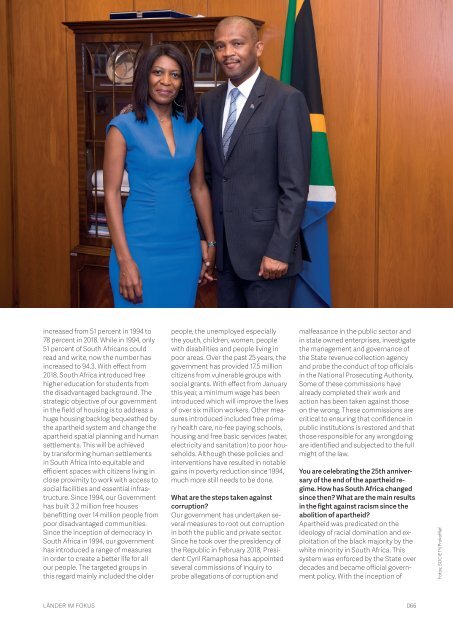SOCIETY 375
Erfolgreiche ePaper selbst erstellen
Machen Sie aus Ihren PDF Publikationen ein blätterbares Flipbook mit unserer einzigartigen Google optimierten e-Paper Software.
increased from 51 percent in 1994 to<br />
78 percent in 2018. While in 1994, only<br />
51 percent of South Africans could<br />
read and write, now the number has<br />
increased to 94.3. With effect from<br />
2018, South Africa introduced free<br />
higher education for students from<br />
the disadvantaged background. The<br />
strategic objective of our government<br />
in the field of housing is to address a<br />
huge housing backlog bequeathed by<br />
the apartheid system and change the<br />
apartheid spatial planning and human<br />
settlements. This will be achieved<br />
by transforming human settlements<br />
in South Africa into equitable and<br />
efficient spaces with citizens living in<br />
close proximity to work with access to<br />
social facilities and essential infrastructure.<br />
Since 1994, our Government<br />
has built 3.2 million free houses<br />
benefitting over 14 million people from<br />
poor disadvantaged communities.<br />
Since the inception of democracy in<br />
South Africa in 1994, our government<br />
has introduced a range of measures<br />
in order to create a better life for all<br />
our people. The targeted groups in<br />
this regard mainly included the older<br />
people, the unemployed especially<br />
the youth, children, women, people<br />
with disabilities and people living in<br />
poor areas. Over the past 25 years, the<br />
government has provided 17.5 million<br />
citizens from vulnerable groups with<br />
social grants. With effect from January<br />
this year, a minimum wage has been<br />
introduced which will improve the lives<br />
of over six million workers. Other measures<br />
introduced included free primary<br />
health care, no-fee paying schools,<br />
housing and free basic services (water,<br />
electricity and sanitation) to poor households.<br />
Although these policies and<br />
interventions have resulted in notable<br />
gains in poverty reduction since 1994,<br />
much more still needs to be done.<br />
What are the steps taken against<br />
corruption?<br />
Our government has undertaken several<br />
measures to root out corruption<br />
in both the public and private sector.<br />
Since he took over the presidency of<br />
the Republic in February 2018, President<br />
Cyril Ramaphosa has appointed<br />
several commissions of inquiry to<br />
probe allegations of corruption and<br />
malfeasance in the public sector and<br />
in state owned enterprises, investigate<br />
the management and governance of<br />
the State revenue collection agency<br />
and probe the conduct of top officials<br />
in the National Prosecuting Authority.<br />
Some of these commissions have<br />
already completed their work and<br />
action has been taken against those<br />
on the wrong. These commissions are<br />
critical to ensuring that confidence in<br />
public institutions is restored and that<br />
those responsible for any wrongdoing<br />
are identified and subjected to the full<br />
might of the law.<br />
You are celebrating the 25th anniversary<br />
of the end of the apartheid regime.<br />
How has South Africa changed<br />
since then? What are the main results<br />
in the fight against racism since the<br />
abolition of apartheid?<br />
Apartheid was predicated on the<br />
ideology of racial domination and exploitation<br />
of the black majority by the<br />
white minority in South Africa. This<br />
system was enforced by the State over<br />
decades and became official government<br />
policy. With the inception of<br />
Fotos: <strong>SOCIETY</strong>/Prokoffief<br />
LÄNDER IM FOKUS<br />
066



